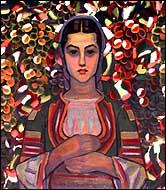Some things to start with
|
|
Culture: The first Slavonic state that officially adopted Christianity (865 AD). At this time Cyril and Methodius found refuge in Bulgaria and translated all important church books from Greek into Bulgarian using the newly created by them Cyrillic alphabet. 200 years later Bulgarian missionaries brought Christianity to Russia, (Kiev-Russia), Serbia, Roumania. |
|
|
History 500 years Turkish yoke, deliberated in 1877 by Russia (which explains the close connections between the two nations). More about the history of Bulgaria can be found here. You can also take a tour in the National History Museum in Sofia. |
|
|
|
|
Everyday life Very important are the good relationships to the neighbours; it is not unusual to visit them without invitation or call in advance. In the province (villages and smaller towns) at every visit the host will serve the best food /wine in the house to the guest; if the visitor has to stay overnight, the most comfortable bed/room will be given to the guest. There is no excuse for not offering accommodation - if there is no spare room or bed, the host will sleep on the ground, but there will be always a bed for the visitor! This traditional hospitality has cooled down a bit in Sofia and the bigger towns, as a result of the conditions for life and the poorness of people. The free time is usually an improvisation. In the warm months from May till October, is the season of "italian nights" in Bulgaria: the people go out in the evening, in the parks or in the streets. The numerous Cafes are full of people watching at the passing crowds of youngsters and not so young ones. The weekends are mainly used for work at home or in the garden. Most of the people in Sofia go to the country, back to the villages or towns where they were born, to visit their parents and grandparents and to fill the car with fresh fruits and vegetables (in the autumn with preserves). People in the bigger towns go to work on the gardens of their cottages where they grow vegetables. |
|
|
|
|||
|
What do people eat Mostly vegetables, but also meat (cooked or grilled). Could be quite fatty, but usually combined with salads and wine, doesn't feel heavy. Balkan-cuisine, similar to Greek, Turkish and Yugoslav. All Bulgarians prepare their own preserves in the summer-autumn time when the vegetables and fruits are cheaper. |
|
|
Most typical food Bulgarian Yogurt. In the beginning of this century, West European scientists (physicians and chemists) made a large study of Bulgarian food, motivated by the long average lifetime of people in Bulgaria. At that time Bulgaria was the country with the biggest number of people over 100 yrs old in the world! Their hypothesis was that this is due to the local yogurt (Lactus Bulgaricus) consumed in big amounts. These results drove attention in West Europe to this type of food and yogurt came in vogue. In this sense Bulgaria can be considered as the homeland of yogurt (though the name is turkish). Bulgarian yogurt is exported in many countries in the world, and is especially well known for example in Japan. |
|
|
Bulgarian wines are very good and widely exported (especially the red ones; luckily the white wines are prefered in the country, and Bulgarians gladly export their red wines). One shouldn't buy vines that are aged more than 5-6 years, since the quality doesn't improve with age, it seems that the stability is not great. The best age of most BG wines on the market would be 2-5 years. Good Bulgarian wines can compare with French wines in quality, but the prices are incomparably lower....
|
|
Famous
people History: Cyril and Methodius who created the Cyrillic alphabet, in which Russia, Ukraine, Serbia, and Bulgaria are writing up till now, Vassil Levski a legendary person, who organized a network of committees for fight against the Turk occupation, Hristo Botev, a poet and revolutionary who died fighting against the Turk occupation - the Bulgarian Shandor Petjofi. Science and Technology: Mathematics: In the 2001 international mathematical olympiad in Washington DC, the Bulgarian team scored 4th with 3 gold and 3 silver medals (after China, Russia, Kazachstan). The Bulgarian high school students have been consistently among the best in the world in Maths! Literature: Elias Canetti, Nobel Laureate for Literature in 1981. Opera Singers: Boris Christov (one of the greatest bassos in the history of singing), Rajna Kabaivanska, Ghena Dimitrova (soprano), Nikolaj Gjaurov (basso),Vesselina Katsarova (the World's current No 1 mezzo-soprano), Artists: Christo (the pop artist who wrapped the German Reichstag in 1995). |
|
|
|
Folklore The Mystery of Bulgarian Voices Books about Bulgarian Art, History, Architecture etc.. The Bulgarian Village in Photographs (a community for sharing pictures from BG villages)
|
Favourite
Sports Football!!
In 1994 the Bulgarian National Team played on the quarter-final of the World
Championship.
|
If you want to see more pictures from Bulgaria, click |
|
If you want to visit Bulgaria, click |
|











